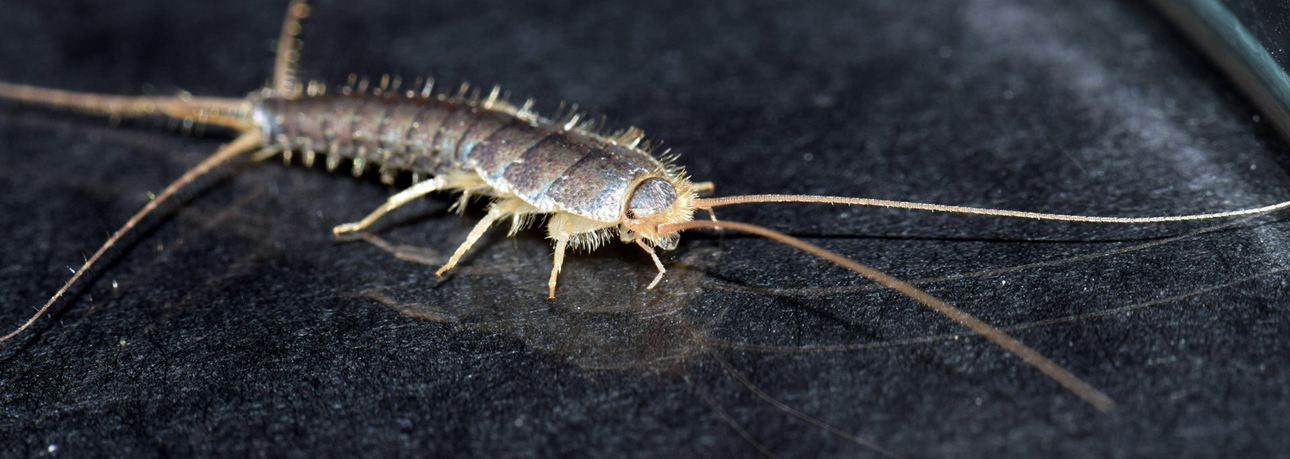Silverfish Pest Control & Removal Service
Silverfish in Orange County
Silverfish are common household pests in Orange County, known for their destructive feeding habits and preference for dark, humid environments. While they are not harmful to humans, they can cause significant damage to books, wallpaper, clothing, and other paper-based materials. Understanding their behavior, life cycle, and control methods can help homeowners keep these pests at bay.

Identification
Silverfish (Lepisma saccharina) are small, wingless insects with a distinctive teardrop shape. They measure about 12-19 mm in length and are covered in shiny, silvery-gray scales. Their long antennae and three tail-like appendages at the rear give them a unique appearance. Silverfish move in a wiggling, fish-like motion, which is how they got their name.
Behavior
Silverfish are nocturnal and highly secretive, making them difficult to detect until an infestation becomes significant. They thrive in dark, humid areas such as basements, attics, kitchens, and bathrooms. These insects are rapid runners but do not jump or fly. Silverfish are known for their long lifespan, often living up to three years or more, which allows their populations to grow steadily if left unchecked.
Life Cycle
Silverfish go through a simple metamorphosis consisting of three stages:
1. Egg
Female silverfish lay small, white eggs in cracks, crevices, and other hidden areas.
2. nymph
After hatching, young silverfish (nymphs) resemble smaller versions of adults but lack the characteristic silvery scales.
3. adult
Over several molts, nymphs develop their characteristic scales and mature into fully grown adults.
Silverfish can reproduce rapidly, with females laying eggs continuously throughout their lives, contributing to persistent infestations.
Diet
Silverfish are scavengers with a diet high in carbohydrates and starches. They commonly feed on:
- Paper, books, and wallpaper glue
- Clothing and fabrics (especially those containing starch)
- Cereal, flour, and other dry goods
- Dead insects and organic debris
Because of their diverse diet, silverfish infestations can cause considerable damage to stored items and household materials.
Habitat
Silverfish prefer warm, humid environments with temperatures between 70-90°F and humidity levels above 75%. Common hiding spots include:
- Bathrooms and kitchens
- Attics and basements
- Closets and stored clothing
- Behind wallpaper and baseboards
Key Takeaways and Control Methods
Silverfish can be challenging to eliminate due to their secretive nature and rapid reproduction. Here are some effective strategies to prevent and control infestations:
Reduce Humidity
Use dehumidifiers and improve ventilation in attics, basements, and bathrooms to create an inhospitable environment.
Eliminate Food Sources
Store paper, books, and dry foods in sealed containers to reduce their access to food.
Seal Entry Points
Caulk cracks, gaps, and openings in walls, floors, and foundations to prevent silverfish from entering.
Regular Cleaning
Vacuum frequently, especially in dark corners, to remove food particles and eggs.
Use Natural Repellents
Diatomaceous earth, cedar shavings, and essential oils like lavender and citrus can help deter silverfish.
Professional Treatment
For severe infestations, professional pest control services can provide targeted treatments and long-term prevention.
Reduce Moisture
Fix leaks, use dehumidifiers, and improve ventilation to eliminate the damp conditions centipedes thrive in.
Eliminate Food Sources
Since centipedes feed on other insects, regular pest control treatments can help reduce their prey and, in turn, their presence.
Seal Entry Points
Close gaps around doors, windows, and foundation cracks to prevent centipedes from entering your home.
Declutter and Clean
Remove piles of debris, wood, and organic matter around your home that may serve as shelter.
Targeted Treatments
Professional pest control applications in key areas can help reduce centipede populations and prevent future issues.
If silverfish are damaging your belongings or becoming a persistent nuisance, our expert pest control team can help. We offer customized treatments to eliminate infestations and prevent future outbreaks. Contact us today for a consultation and effective pest management solutions!
our services
Simple Solutions To Complex Problems at an Affordable Rate

Residential
We offer a variety of plans custom fit for your needs! Whether its an endless trail of ants, or strange noises in the walls, we’ve got your pest control needs covered!

Commercial
We can stop pests from causing costly machinery repairs, fines, closures, and damage to your reputation!

rodents
Various species of rats and mice inhabit the Orange County area. Remove rodents from your home permanently with our exclusion services.

mosquito
We use the In2Care system to eliminate mosquitoes where they breed—protecting your family’s health and comfort.

